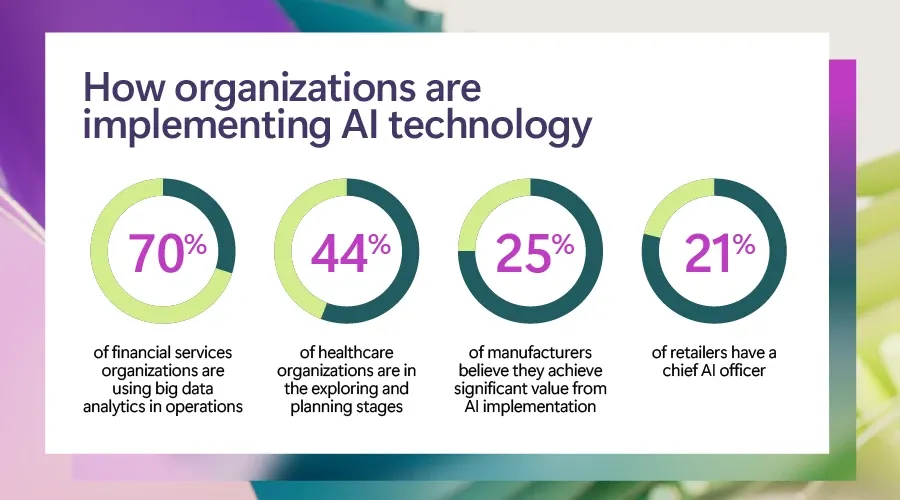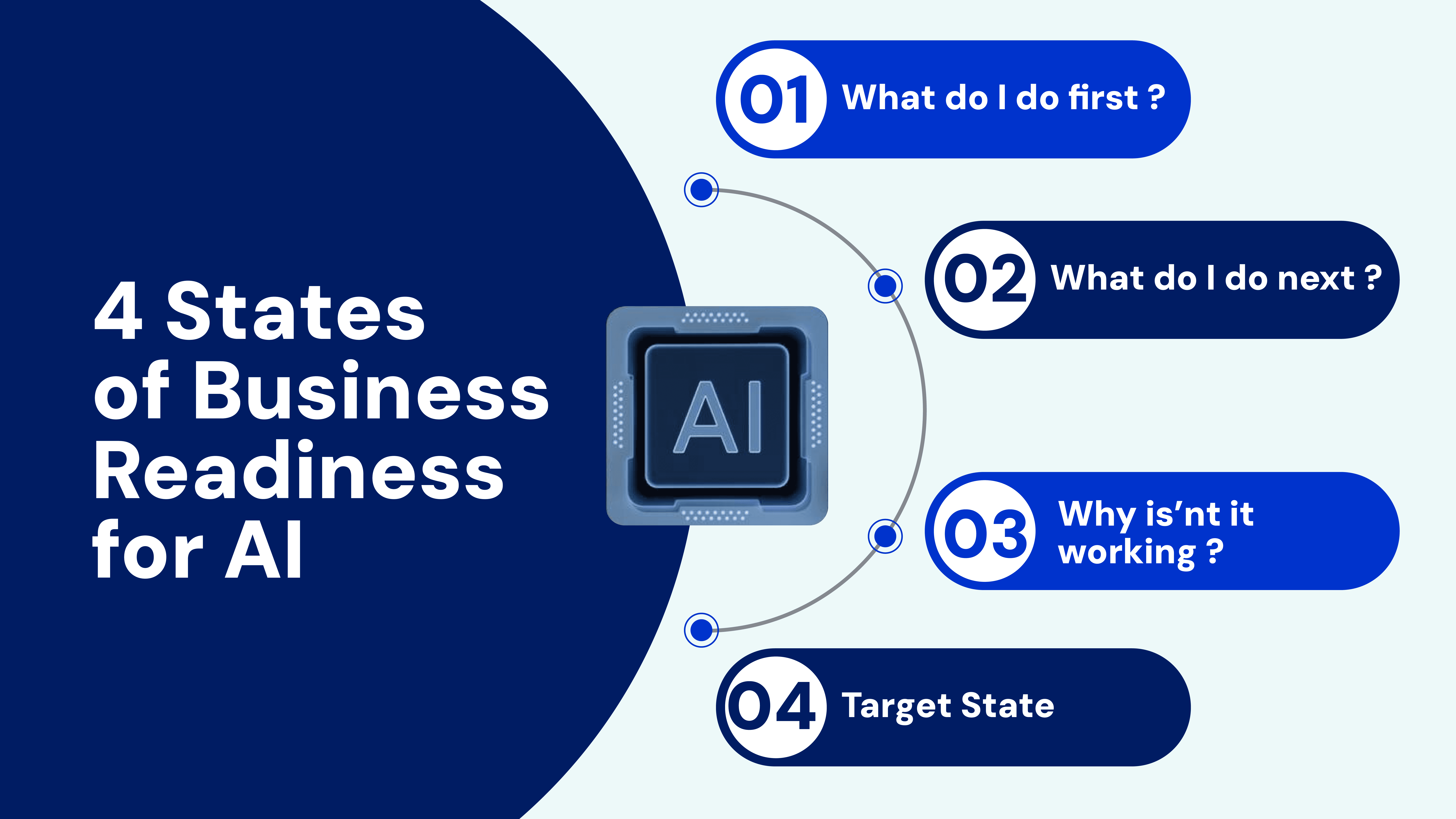business resources
Business AI Health Check
22 Jul 2025, 10:36 am GMT+1
How ready is your business for Artificial Intelligence? It’s not about becoming a tech giant overnight; it’s about knowing where you stand, what’s possible, and how to start. With practical tools, a readiness scorecard, and real-world examples, even the smallest business can begin its AI journey with clarity and confidence.
When I first looked into AI for small businesses, it felt like it was something only tech giants could afford or understand.
But the truth is,
AI has become more accessible, more practical and more necessary for small and medium-sized enterprises (SMEs) like yours and mine looking to stay competitive in today’s fast-moving world.
Whether you’re just starting to explore how AI can support your business or you’ve already begun using tools like Otter.ai for meeting transcriptions or Levity to sort emails.
The real question is: where do you really stand when it comes to AI?
SMEs are the backbone of the global economy, with around 400 million SMEs globally, making up over 95% of businesses and contributing up to 70% of employment. Small and medium-sized enterprises aren’t just part of the economy; they are the economy. In places like the EU, SMEs represent 99% of all businesses.
If you're running an SME, be proud.
And now, as the digital landscape evolves, AI is becoming a real game-changer. You don’t need a massive budget or a team of data scientists to get started. Businesses like eye-oo have used AI chatbots to boost sales by 25%, while startups like Thriva are using AI to offer personalised health insights from blood tests.
This isn’t sci-fi, it’s happening right now.
Why does AI matter for SMEs?

AI provides SMEs with transformative capabilities, from automating routine tasks to unlocking advanced analytics and customer insights. Key benefits include:
Automation
- Call Transcriptions: Tools like Otter.ai and Wingman automate meeting and customer call transcriptions.
- Schedule Management: Apps such as Motion and Akiflow optimise daily work schedules.
- Inbox Management: Solutions like Levity streamline inbox organisation.
- Finance & Accounting: AI can automate invoicing, track expenses, and identify financial patterns.
- Data Entry: Tools like Docuf.AI and AutoExtract.ai handle document processing and data entry.
Supply chain optimisation
AI improves demand forecasting, minimises stockouts, reduces waste, and optimises logistics, enhancing the resilience and efficiency of supply chains.
Customer engagement
- Chatbots provide instant answers to customer queries, reducing wait times.
- Recommendation Engines personalise product offers based on customer behaviour.
- Marketing Analytics refine targeting strategies and improves return on investment (ROI).
Advanced analytics and decision-making
AI supports data-driven decision-making through real-time insights. SMEs can segment customers, predict sales trends, personalise interactions, and enhance cybersecurity.
Innovation
AI also fuels product and service innovation. For instance:
- UK-based healthtech company Thriva employs AI to analyse blood tests and provide personalised health insights.
- Online retailer eye-oo uses AI chatbots to answer FAQs, suggest products, and recover abandoned shopping carts, leading to a 25% sales increase and reduced customer response times.
So, Where Do You Stand?
Whether you’re just getting started with AI or already on your way, understanding your business’s current level of AI maturity is key.
In the following section, you'll find checklists, tools, and resources to help you:
- Reflect on your organisation’s AI readiness
- Identify opportunities for smarter integration
- Plan practical, achievable next steps tailored to your business size and goals
AI doesn’t have to be overwhelming. With the right guidance, it can become a natural, valuable part of how your SME grows and thrives.
That’s why we’ve included two practical resources to help guide your next steps:
- AI Survey – A quick, reflective tool to help you assess how you, your team, and your business are currently approaching AI. What are you doing? What’s working? What could be next?
- AI Readiness Scorecard – A structured framework to evaluate your organisation’s preparedness across key areas like strategy, skills, data, and infrastructure. Use it to identify strengths, spot gaps, and prioritise where to focus next.
These tools are designed to meet you where you are, whether you’re an AI beginner or already experimenting with solutions. Think of them as your starting point for building a smarter, more resilient business in the age of AI.
Let’s dive in and see where your business stands.
The AI Survey: Understanding your business position
A simple yet insightful AI survey helps SMEs gauge their current status:
- AI Awareness: Are you familiar with AI? Are you using it, exploring it, or unaware of its potential?
- Current AI Adoption: Are you leveraging AI in customer support, marketing, operations, decision-making, cybersecurity, or other areas?
- Barriers to Adoption: Are challenges like high costs, lack of expertise, unclear ROI, or data security concerns preventing adoption?
- Future Plans: Are you likely to invest in AI within the next 1-2 years? What initiatives are you considering?
This reflective tool offers a clear understanding of your organisation's AI engagement and priorities.
The AI readiness scorecard

Adopting AI is not just about technology—it requires cultural, strategic, and leadership alignment. The AI Readiness Scorecard offers SMEs a structured framework to assess preparedness across seven critical dimensions:
1. Data Foundations
- Data Quality & Accessibility: Are data sources reliable, standardised, and accessible?
- Data Governance: Are there formal governance policies?
- Data Integration: Are systems interconnected?
- Data Volume & Variety: Do you collect sufficient, diverse data for AI?
- Data Privacy & Security: Are data protection standards robust?
2. Technical Infrastructure
- Computing Resources: Are your computing resources AI-ready?
- Development Environment: Do you have standard AI development tools?
- API and Integration: Are systems easily integrated?
- Technology Stack: Is your tech stack modern and AI-compatible?
- Cloud & Scalability: Are your solutions scalable through cloud infrastructure?
3. Organisational Culture
- Innovation Mindset: Does your team embrace innovation?
- Data-Driven Decisions: Is decision-making based on data?
- Collaboration: Do departments collaborate effectively?
- Change Readiness: Are you open to transformation?
- Continuous Learning: Are there opportunities for learning and development?
4. Leadership Support
- Executive Commitment: Are leaders committed to AI initiatives?
- Vision & Sponsorship: Is there a clear AI adoption vision?
- Risk Tolerance: Are calculated risks encouraged?
- Long-Term Focus: Is there a long-term strategic commitment?
- Resource Allocation: Are resources allocated for AI initiatives?
5. AI Strategy and Planning
- Strategic Alignment: Are AI initiatives aligned with business objectives?
- Use Case Prioritisation: Are AI applications prioritised based on impact?
- Implementation Roadmap: Is there a clear roadmap?
- Measurement Framework: Are outcomes measured effectively?
- Portfolio Management: Are AI projects coordinated?
6. Ethical and Social Considerations
- Ethics Framework: Are ethical guidelines in place?
- Bias and Fairness: Is AI bias monitored?
- Transparency: Can AI decisions be explained?
- Privacy: Is data privacy prioritised?
- Societal Impact: Are societal impacts considered?
7. Talent and Skills Ecosystem
- AI Expertise: Does your team possess AI knowledge?
- Technical Skills: Are technical skills adequate?
- Domain Knowledge Integration: Is business knowledge integrated into AI projects?
- Talent Acquisition & Retention: Are AI professionals recruited and retained?
- Training and Development: Are AI learning opportunities provided?
By scoring your organisation across these dimensions (1-5 scale), you can classify your AI maturity level:
- Nascent (1.0-2.0): Limited capabilities
- Emerging (2.1-3.0): Basic foundation
- Developing (3.1-4.0): Moderate capabilities
- Advanced (4.1-4.5): Strong capabilities
- Leading (4.6-5.0): Best practice leadership
Case Study: UNESCO AI Readiness Assessment Methodology
The UNESCO AI Readiness Assessment Methodology represents a comprehensive framework designed specifically for educational institutions and government bodies to evaluate their preparedness for AI integration. This approach merits detailed examination as it balances technical considerations with broader societal impacts.
Methodology Overview
UNESCO's framework is structured around five interconnected dimensions:
- Policy and Governance: Evaluating regulatory frameworks, strategic planning, and institutional arrangements
- Infrastructure and Data: Assessing technological readiness and data ecosystems
- Capacity Development: Measuring human capabilities and educational alignment
- Equity and Inclusion: Examining accessibility and representation across diverse groups
- Ethics and Values: Evaluating alignment with human rights and ethical principles
Implementation Case: National Education System
A ministry of education in a middle-income country utilised UNESCO's methodology to assess AI readiness across its educational infrastructure. The initial assessment revealed:
- Moderate policy frameworks (3.2) with established digital transformation strategies
- Limited infrastructure in rural areas (2.4) creates significant equity concerns
- Strong capacity development initiatives (3.8) through teacher training programmes
- Significant gaps in ethical frameworks (2.1) and inclusion considerations (2.3)
Based on this assessment, the ministry prioritised:
- Developing comprehensive ethical guidelines for AI in education
- Implementing infrastructure improvements targeting underserved regions
- Establishing a cross-ministerial governance structure for AI initiatives
- Creating an AI curriculum framework with emphasis on critical literacy
After 24 months of implementation, the ministry reported:
- Improved ethical framework score from 2.1 to 3.9
- Reduced infrastructure disparity between urban and rural areas
- Successful pilot deployment of AI-powered adaptive learning systems in 200 schools
- Development of an internationally recognised AI ethics curriculum
The UNESCO case demonstrates how systematic assessment enables targeted improvements, balancing technological advancement with social responsibility, embodying William Blake's assertion that "What is now proved was once only imagined."
Learning from Industry Benchmarks
Benchmarking your organisation against industry standards offers valuable insights. Current industry averages reveal:
- Financial Services: 3.7
- Healthcare: 3.2
- Manufacturing: 3.0
- Retail: 3.4
- Technology: 3.9
- Government: 2.8
- Education: 2.6
SMEs should aim to close gaps relative to these sectoral averages
Standards Alignment
The AI Readiness Scorecard aligns with established frameworks:
- ISO/IEC 42001: Artificial Intelligence Management System
- IEEE 7000 Series: Ethical considerations in system design
- NIST AI Risk Management Framework: Guidelines for trustworthy AI
- European Union AI Act: Requirements for high-risk AI systems
- UNESCO Recommendation on the Ethics of AI: International standards for ethical AI
- Microsoft Responsible AI Maturity Model: Commercial framework for responsible AI implementation
Action planning for SMEs
The AI readiness journey is ongoing, not a one-time achievement. Organisations should reassess their progress using the scorecard at regular intervals, typically every 6-12 months, to stay on track.
It’s essential to track progress against established baselines and targets, adjusting priorities as the business evolves and new capabilities emerge. Incorporating lessons learned along the way will help refine strategies and improve future planning.
Additionally, staying informed about the latest best practices and industry standards ensures that the organisation continues to adapt and stay competitive in the rapidly changing AI landscape.
Share this
Dinis Guarda
Author
Dinis Guarda is an author, entrepreneur, founder CEO of ztudium, Businessabc, citiesabc.com and Wisdomia.ai. Dinis is an AI leader, researcher and creator who has been building proprietary solutions based on technologies like digital twins, 3D, spatial computing, AR/VR/MR. Dinis is also an author of multiple books, including "4IR AI Blockchain Fintech IoT Reinventing a Nation" and others. Dinis has been collaborating with the likes of UN / UNITAR, UNESCO, European Space Agency, IBM, Siemens, Mastercard, and governments like USAID, and Malaysia Government to mention a few. He has been a guest lecturer at business schools such as Copenhagen Business School. Dinis is ranked as one of the most influential people and thought leaders in Thinkers360 / Rise Global’s The Artificial Intelligence Power 100, Top 10 Thought leaders in AI, smart cities, metaverse, blockchain, fintech.
previous
How is Malaysia Shaping the Next Chapter of AI? Dr. Rais Hussin, CEO of MRANTI, Highlights At Businessabc AI Global Summit
next
How Lawyers for Restaurant Owners Can Offer Guidance?